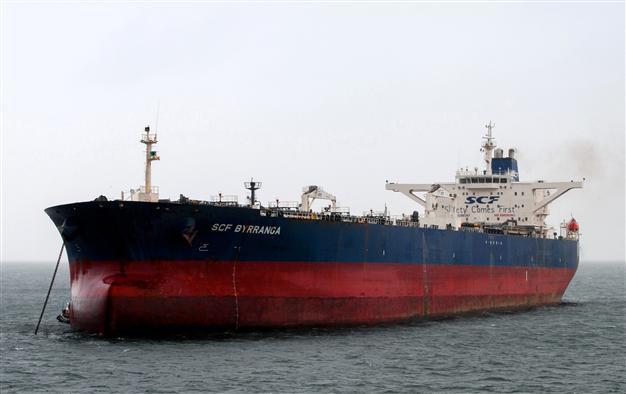Iraq sues Greek shipping firm for transporting Kurdish oil
LONDON - Reuters

File photo of the oil tanker SCF Byrranga, which was renamed the United Kalavrvta in March 2014. REUTERS Photo
Iraq has said it filed a lawsuit against Greek shipping company Marine Management Services (MMS) for its role in the export of crude from the Kurdistan region, which Baghdad says is illegal.
The case is the latest move by Baghdad to deter customers and thwart independent exports of crude from the autonomous Kurdistan region. The federal government claims sole authority to manage sales of all the oil in Iraq.
The Iraqi oil ministry said on Sept. 4 that MMS operated five vessels that had transported oil on behalf of the Kurdistan Regional Government (KRG) from a Turkish port.
“MMS has actively facilitated the KRG’s illegal export scheme, repeatedly ignoring warnings that the crude oil it was carrying does not belong to the KRG,” it said in a statement, which did not specify when and where the case was filed.
“MMS is liable for damages of at least $318 million, and possibly significantly more, as a result of its willing and active participation in the KRG’s illegal crude oil export scheme.”
Athens-based ship manager MMS said it was not aware of any suit filed by the Iraqi government and maintained it was simply carrying out its business of transporting goods.
“We are not a party to this dispute, and any lawsuit filed against us by the Iraqi government is misdirected and ill-advised and will be robustly defended for lacking any basis and foundation,” MMS said in a separate statement on Sept. 4.
“The goods in this case are crude oil, which the KRG claims is rightfully theirs.”
MMS said if there was a dispute over the ownership of the cargoes, it had to be resolved between the government in Baghdad and the KRG “either through a political or failing that a judicial process.”
The Kurds began exporting oil in May via an independent pipeline, which links up with an Iraqi pipeline at the Turkish border to terminate at the Mediterranean port of Ceyhan. More than 10 million barrels of oil have been shipped from the port since then, Turkish Energy Minister Taner Yıldız said on Sept. 4.
The Iraqi oil ministry said MMS had declared false destinations for its tankers, turned off its ships’ tracking systems to avoid detection and undertaken ship-to-ship transfers of oil on the high seas at night, a process it described as “dangerous.”
Oil output in Iraq’s Kirkuk slumps 90 percent
ISTANBUL Reuters
Oil output in Iraq’s Kirkuk has slumped to 30,000 barrels a day since June, 90 percent down on earlier this year, and a federal pipeline to the Turkish port of Ceyhan may be out of action for over a year due to sabotage, Kirkuk’s governor said on Sept. 4.
Islamic State (IS) fighters have seized swathes of territory in lightning offensives in the arid but oil-rich north of the country, and have repeatedly attacked oil installations.
In February this year Iraqi oil production hit record highs of 2.8 million bpd nationwide, with an estimated 300,000 bpd coming from the northern province of Kirkuk.
“There have been no exports since March and the only production in Kirkuk has been the 30,000 bpd to a small refinery and enough gas to get our electrical grid going since June 8,” Najmaldin Karim, Kirkuk’s governor told reporters at an industry conference in Istanbul.
“I don’t think there will be exports from Kirkuk to the Ceyhan pipeline any time soon. It has been sabotaged continuously and to get it all back would take at least a year or more,” he added.
The federal pipeline from Kirkuk to Ceyhan has a capacity of 1.6 million bpd but has for years been operating at around a third of that, and recently even less, a Turkish official said.
Damage to the pipeline is a further blow to the beleaguered authorities in Baghdad, but will not affect the Kurdistan Regional Government (KRG), which began exporting oil in May via its own pipeline, which links to the federal Iraqi pipeline at Turkey’s border, and has not been sabotaged.
Kurdistan’s oil production is expected to rise to 400,000 bpd in 2014 from 250,000 bpd, according to Tony Hayward, chief executive of Anglo-Turkish Genel Energy, the region’s largest producer.
